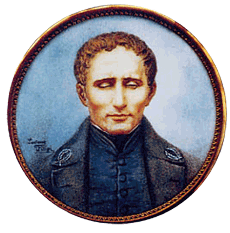Louis Braille
 Now a household name, Louis Braille's inauspicious start in rural France could hardly foretell the incredible impact that he would have on millions for centuries to come.
Now a household name, Louis Braille's inauspicious start in rural France could hardly foretell the incredible impact that he would have on millions for centuries to come.
Born in 1809, Braille was blinded at age three by accidentally stabbing his eye with his father's leather-working awl. An infection soon spread to both eyes and Braille became completely blind soon after. However, when he was ten, Braille earned a scholarship to the Royal Institution for Blind Youth in Paris, one of the first of its kind.
Inspired by a visiting soldier sharing a phonetic method that the military sometimes used for a code displaying sounds with raised dots, Braille adapted it and created a more efficient method that actually displayed the letters of the alphabet.
The change from phonetic representations to a literal translation of the alphabet was revolutionary. His creation became a hit with fellow students, but was not accepted by the sighted instructors in the blindness field (such as it was at the time).
Braille later adapted the system to include numbers and musical notation. He himself was an accomplished organist and cellist. He later became a well-respected teacher at the school he attended as a boy. He died of tuberculosis from poor conditions at the school at the age of forty-three, years before the significance of his achievements would be realized the world over.